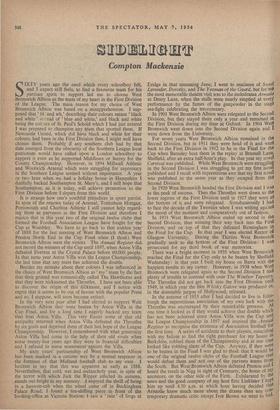Compton Mackenzie
SIXTY years ago the need which every schoolboy fell., and I expect still feels, to find a favourite team for his partisan spirit to support led me to choose West Bromwich Albion as the team of my heart in the First Division of the League. The main reason for my choice of West Bromwich Albion was based on a misapprehension. I sup- posed that ' bl. and wh.' describing their colours meant ' black and white' in :'ead of ' blue and white,' and black and white being the colours of St. Paul's School which I had just entered I was prepared to champion any team that sported them. If Newcastle United, which did have black and white for their colours, had been in the First Division then, I might well have chosen them. Probably if any southern club had by that date emerged from the obscurity of the Southern League local patriotism would have called upon a London schoolboy to support it even as he supported Middlesex or Surrey for the County Championship. However, in 1894 Millwall Athletic and Woolwich Arsenal which were struggling for supremacy in the Southern League seemed without importance. A year or two later when we had a holiday house in Hampshire I dutifully backed Southampton St. Mary's, and ,I still hope that Southampton, as it is today, will achieve promotion to the First Division before I depart from this world.
It is strange how one's youthful prejudices in sport persist. In spite of the renown today of Arsenal, Tottenham Hotspur. Portsmouth and Charlton Athletic I still cannot help regard- ing them as parvenus in the First Division and therefore I rejoice that in this year two of the original twelve clubs that formed the Football Association League have fought for the Cup at Wembley. We have to go back to that sodden year of 1888 for the last meeting of West Bromwich Albion and Preston North End in the Cup Final when .(I think) West Bromwich Albion were the victors. The Annual Register did. not record the winners of the Cup until 1897, when Aston Villa. defeated Everton at the Crystal Palace before 60,000 people. In that same year Aston Villa won the League Championship, the last time that any team has achieved the double.
Besides my mistake about their colours I was influenced in the choice of West Bromwich Albion as ' my' team by the fact that their ground was romantically called The Hawthorns and that they were nicknamed the Throstles. I have not been able to discover the origin of this nickname, and I notice with regret that it seems to be out of favour with the popular Press and so, I suppose, will soon become extinct. In the very next year after I had elected to support We'st Bromwich Albion they were beaten by Aston Villa in the Cup Final, and for a long time I eagerly backed any team that beat Aston Villa. This very Easter some of that old antipathy returned when Aston Villa defeated the Throstles by six goals and deprived them of their last hope of the League Championship. However, I remembered with what generosity Aston Villa had come to the help of their old rivals when some twenty-five years ago they were in financial difficulties and I refused to nurse resentment against the Villa. Eridge in that streaming June; I went to matinees of Siceel Lavender, Dorothy, and The Yeoman of the Gerard, but for me the most memorable theatre visit was to the melodrama. Armada at Drury Lane, when the stalls were nearly emptied at every performance by the fumes of the gunpowder in the stage sea-fight celebrating the tercentenary. In 1901 West Bromwich Albion were relegated to the Second Division, but they stayed there only a year -and remained in the First Division during my time at Oxford. In 1904 West Bromwich went down into the Second Division again and I went down from the University. For seven years West Bromwich Albion remained in the Second Division. but in 1911 they were head of it and wait back to the First Division in 1912 to be in the Final for the Cup when Barnsley beat them in the replay at Bramall Lane, Sheffield, after an extra half-hour's play. In that year my novel Carnival was published. While West Bromwich were struggling in the Second Division I was struggling to get my first novel published and Irecall with superstitious awe that my first novel was published in the same year as they escaped from the Second Division.
In 1920 West Bromwich headed the First Division and I wag at the peak of success. Then the Throstles went down to the lower regions of the First Division until in 1927 .they were at the bottom of it and were relegated. Simultaneously I had to face the decade of the Twenties when I was writing against the mood of the moment and comparatively out of fashion. In 1931 West Bromwich Albion ended up second in the Second Division, thus winning their way back into the First Division; and on top of that they defeated Birmingham in the Final for the Cup. In that year I was elected Rector of Glasgow University. During the Thirties West Bromwich gradually sank to the bottom of the First Division: I was prosecuted for my third book of war memories. There was a bright moment in 1935 when West Bromwich reached the Final for the Cup only to be beaten by Sheffield Wednesday: in that year I built my house on Barra with the happiest results to my career. However, in 1938 when West Bromwich were relegated again to the Second .Divilion I had plenty of trouble to contend with over The Windsor Tapestry. The Throstles did not get back into the First Division until 1949, in which year the film Whisky Galore was produced or, in the detestable jargon of Hollywood, released.










































 Previous page
Previous page